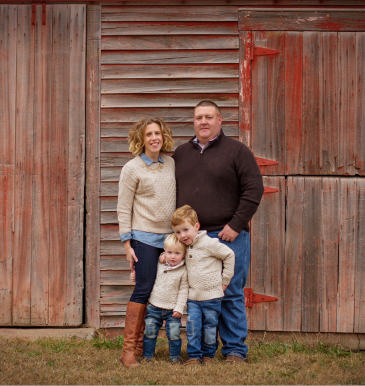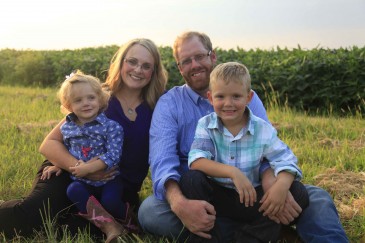By Rick McNary on August 6, 2018
Making the right food choices

If you’re looking for someone to trust about your food choices, look no further. If you’re confused by labeling and frightened by what you hear about GMOs, hormones and antibiotics, we have some people you should visit with.
“If I’m standing in the produce section and have a question, the first person I ask is a mom, especially a farm mom,” says Jancey Hall of Manhattan. “Farm moms are like all moms – they want what’s best for their kids and are buying their food at the same grocery store I am.”
CommonGround Kansas is a group of farm moms dedicated to providing truthful answers to people concerned about the food they purchase. As part of a national movement, their goal is to connect farm moms with consumers. Their core principles are:
- Fearless food choices
- Shared values
 “We brought in a few women with no ties to farming and asked them questions,” says Katie Stockstill Sawyer, a farm mom from McPherson. “We wanted to know what they were thinking about their food choices. They were brutally honest about how overwhelming it is to buy food; it’s like wandering through a big, confusing maze. They were relieved to talk with farm moms who actually grow the food. We weren’t trying to change their mind; we just wanted them to make decisions based on facts, not fear.”
“We brought in a few women with no ties to farming and asked them questions,” says Katie Stockstill Sawyer, a farm mom from McPherson. “We wanted to know what they were thinking about their food choices. They were brutally honest about how overwhelming it is to buy food; it’s like wandering through a big, confusing maze. They were relieved to talk with farm moms who actually grow the food. We weren’t trying to change their mind; we just wanted them to make decisions based on facts, not fear.”
Things change
In the early history of America, people were more connected to farmers because the lack of transportation meant they purchased their produce, meat and milk from local farmers. Now, however, some estimate that an average calorie travels 1,500 miles from farm to plate, putting a question mark to who grew the food we purchase.
“The average person is three to five generations removed from a farm,” says LaVell Winsor, a farm mom near Grantville. “People drive by our farms but don’t know what we do. Therefore, we are intentional with outreach to meet people where they are. Women like our Yoga on the Farm events where they can be outside, see the cattle grazing in the distance, sample ag-related snacks and meet those of us who grow it. We put a face to their food.
“We’re inclusive of all kinds of agricultural production. We know the questions come from a place of serious concern and confusing messages. People just want to know the truth.”
Even our government is concerned about people not knowing where their food comes from, so the USDA launched the Know Your Food, Know Your Farmer initiative to help connect consumers to farmers.
Historically, farm families quietly go about the hard work of farming. They start chores before sunrise and often work beyond the last light of day. However, while they quietly went about their business, they discovered corporations and groups were launching fear-based campaigns with untruths against their way of farming.
“We are hard-working Americans doing the best we can to provide safe food for the world,” Sawyer says. “We want to be a beacon of truthfulness and say, ‘here’s what I know, if I can’t help you, I can connect you with someone who can.’”
Perspective is key
CommonGround volunteers create unique ways to meet consumers, such as Yoga on the Farm or setting up their Not a Latte stand at a football game.
“We like to put things in perspective with our stand,” says Kim Baldwin, who farms near Inman. “We use a latte cup to explain that one cup of pesticide is all we use on one acre of land, which is the size of a football field; most of what we spray is water.”
Another creative technique is the Ask a Farmer interaction in some grocery stores. If you push a large button, a real and friendly farm mom walks up to answer your questions.
“We also like to host mommy bloggers and food bloggers on our farms,” Sawyer says. “Once people come into our world, the barriers break down and the questions start. We also do this as part of our everyday life. Sometimes people don’t ask direct questions but are kind of wondering aloud. We can interject information and truth into our peer groups.”
Although you frequently hear attacks on the corporate farm in America, the fact is family farms, like the ones the moms of CommonGround come from, make up 97.1 percent of farms in America. Moreover, less than two percent of our population is feeding us.
Facts, not fear
Amidst the confusing messages of fear-laced marketing, contradictory reports and fake news, the average consumer is looking for someone to trust. Research by the Center for Food Integrity indicates a high level of public trust for farmers.
“Farmers didn’t know they needed to speak up, but now they need to,” Hall says. “When they speak, its not with a goal of I’m right and you’re wrong, they just want you to base your decisions on facts, not fear. We focus on ways we are similar, not the ways we are different. There is just something about a farm mom that makes you trust them.”
For me, I’ll trust the farm mom every time. If she says it’s healthy for her family, then it’s healthy for mine.







